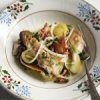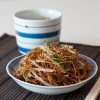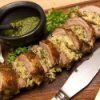GRAHAM'S HOT TIPS

Every recipe at NeedaRecipe.com includes a helpful tip either from me or, in the case of a recipe submitted by a reader, the person who submitted the recipe. Sometimes about the preparation and cooking of the recipe in question, and sometimes just a good serving suggestion.
There are, however, tips that apply to many recipes and these are listed here for quick reference. There are many nuggets amongst them... take good note!!
CHICKEN
- If, in the beginning, you are uncertain whether your chicken is cooked right through, push a sharp, pointed knife into the flesh. It should not be blood red and no blood should run from the cut. With practice, you'll soon be able to judge when your chicken is cooked.
- To avoid the shell cracking when you put an egg in hot water, remove it from the fridge a little while before using to allow it to approach room temperature.
- When boiling an egg, lower it gently into the pan using a spoon, just before the water actually boils.
- If you add a little vinegar to the water prior to putting the eggs in the pan, you will avoid any egg leaking out in the event that the shell is slightly cracked.
- Once cooked, either eat a boiled egg immediately or gently crack one end to prevent further cooking inside the shell.
- To remove the shell from a cooked egg, tap it gently to make a small crack, then place the egg in cold water. Roll it between the palms of your hands to further crack it and then carefully peel the shell away. It will be made easier if you keep your hands and the egg wet.
- Hard-boiled eggs can be stored (with the shells still on) in a refrigerator for 4 or 5 days (but do not try to freeze them). If, for any reason, your boiled eggs get mixed up with your fresh eggs, you can tell the difference using 'Graham's Spin Test'! Place the egg on a flat surface and spin it. If is spins and slows down evenly, it is hard-boiled. If it spins and slows down erratically, it has not been cooked.
- The most common fault when frying an egg is to break it into oil that is too hot. This almost always causes the yolk to break and makes the underside of the egg like burned velcro! Break your egg into the oil very early on and cook gently. If the oil begins to spit, turn down the heat straight away.
- If you want to save the oil after frying an egg, make sure that you use it only for frying, otherwise it will affect the flavour of your other food.
- For pan-cooked scrambled egg, keep the mixture moving in the pan and cook it very slowly.
- For microwave-cooked scrambled egg, do not leave it too long before remixing. Check it every few seconds before the end and remove while it is still slightly undercooked since it will continue to cook for a short while in its own heat.
- Serve your omelettes while the mixture is still slightly 'runny'. If you leave it to 'set' before removing it from the pan, you'll find that it will be hard and rubbery. If you have some fresh double cream in your fridge, you can add a little to the beaten egg (one tablespoon for every four eggs). This is a great way to make an omelette soft and light.
- It happens to all of us: You crack open an egg and a tiny piece of its shell falls into the bowl along with the raw egg. If you’ve tried to get it out with your finger or a spoon, you know the slippery dilemma you face. Next time, wet your finger with water before attempting to fish it out. You’ll be shocked at how easily it can be grabbed and eliminated.
FISH
- If you are cleaning or skinning a fish and it keeps trying to escape, hold it with a cloth or a piece of kitchen paper, or even dip your fingers in salt to help you keep a grip on it.
- To remove fish from a poaching pan can be quite tricky due to its soft texture. To avoid damaging poached fish, make two or three 'strap handles' out of double-thickness aluminium foil folded into strips of about 1" (2.5cm) width. Lay these across the bottom of the pan making sure that they are long enough to also hang over the sides. Cook the fish on top of this 'cradle' then hoist out the cooked fish using the foil 'handles'.
GARLIC
- If you like to flavour certain foods with Garlic but don't like it tasting too strong, before crushing or chopping, cut the cloves down the middle long-ways and remove the central 'germ' (the thin stem that looks like a pale green or translucent vein). You will still be able to enjoy the flavour without everybody referring to you as "The Garlic Dragon" afterwards.
GRILLED AND FRIED FOOD
- Always cook sausages slowly and thoroughly, otherwise it is possible for them to look cooked from the outside but still be pink and uncooked in the middle. Gentle cooking also helps the appearance since you are more likely to finish up with a golden brown sausage rather than a blackened and charred lump of meat!
- If, after a fried meal, you have any sausages or bacon uneaten, put them in the refrigerator since they are delicious cold and make great sandwiches either on their own or with a slice of cheese.
- Tomatoes need to be grilled on a medium heat to prevent the skins burning. They can, however, easily be grilled at the same time as sausages or bacon because there is usually spare room on the grill pan along the edge nearest to you (which is generally the coolest part of the grill).
- Keep checking the underside of Fried Bread as you're cooking. It's easy to burn if you're not careful.
- If you are frying for many people, keep fried food warm in the oven without covering it. A covered dish will allow condensation and moisture to turn crisp food soggy.
- If you want to avoid serving a greasy fry-up; use a light corn or vegetable oil for frying and let fried food rest on a few sheets of absorbent kitchen paper for a moment, either immediately after cooking or, if you have kept the food warm on a plate in the oven, immediately before serving. This allows the kitchen paper to absorb any excess oil or fat.
LEMONS
- Lemons will last months in your fridge. Just slice them in half and place them into the egg storage compartment and you will notice that the skins dehydrate and harden which protects the juice for several months. When ready for use, just squeeze just as you would a fresh lemon. It really works!
MILK
- If you plan boiling milk, putting few spoons of water in the pan before adding the milk reduces the risk of burning the milk on the bottom of the pan.
MUSTARD
- If you have mustard which you do not use very often (or, indeed, a mustard pot without a lid), to avoid it drying out or developing a brown crust, place a slice of lemon on the top. It will keep the mustard perfectly fresh.
ONIONS
- Spring onions used to garnish various dishes (or used in a salad) can be turned into delightful 'Spring Onion Fans'. trim off the green tops and the root base leaving just the bulb and 1½" - 2" (4cm - 5cm) of stem. Using a sharp knife, cut down the stem three or four times, stopping just short of the bulb. Immerse in iced water (cold water with ice cubes is fine) and watch the shredded stems open out and curl!
- If you want to use a raw onion in a salad, you can remove some of the harsh onion taste if you first slice it, heavily salt it and leave to stand for a few minutes. Then rinse in cold water, pat dry with kitchen paper and add to your salad.
PASTA
- To prevent spaghetti and other pastas sticking together after they have been cooked, add 2-3 tablespoons of olive oil or corn oil to the boiling water prior to adding the pasta.
- If you are using a simple pasta to create a quick meal or snack, you can add a beef stock cube to the water for a little extra flavour.
POTATOES
- If you peel potatoes and leave them (uncooked) in water for any length of time, they are likely to turn brown. To prevent this, add some milk to the water and ensure the potatoes are completely covered by the liquid.
- When baking potatoes, pierce them deeply several times with a skewer or thin, sharp knife prior to cooking. This prevents them from 'bursting' while cooking.
- If using a microwave to cook jacket potatoes, keep checking towards the end of cooking to make sure they are not over cooked. They should be firm, but not hard.
- When cooking roast potatoes, make sure that the fat is not too hot when you put them into the baking tray, otherwise it will sizzle and splash. Also ensure that the potatoes are reasonably dry (for the same reason).
- Use only 'old' potatoes for roasting. New potatoes do not roast well.
RICE
- For light, fluffy rice, add 1-2 tablespoons of oil to the boiling water prior to adding the rice.
- While the rice is cooking, boil a kettle of water then, when cooked, tip the rice into a colander and pour boiling water over. This removes any excess starch from the rice and helps prevent it sticking together.
SAUCE
- Keep freshly-cooked hot sauces warm, if necessary, by placing the pan into a larger pan containing a little simmering water. Do not cover since the steam from the water will thin the sauce.
SUGAR
- Brown sugar hardens as its moisture evaporates over time in the cupboard. But you can easily re-moisturize it by putting a piece of wheat bread in it overnight, and plastic over the top.
THICKENING
- If you have made a stew, casserole or gravy and want to thicken the liquid, take a teaspoon of cornflour (cornstarch or wheat starch) and place it in a cup. Add just a little water and stir so the flour dissolves. Stir this, little-by-little, into your cooking.
TOAST
- If you inadvertently burn your toast a little, it may not be necessary to throw it away. Toast that has been scraped with a knife often still tastes burned because the burnt crumbs have fallen back into the bread. To avoid this, scrape the toast with the burnt side facing down. The bitter-tasting crumbs will then fall away from and not into the bread.
TOMATOES
- To remove the skin from a tomato, place it in very hot water (close to boiling) for about one minute. Remove the tomato from the water and you'll find that the skin peels away easily, leaving the flesh perfectly intact.
VEGETABLES
- Occasionally one needs to slow down the cooking of vegetables and put them on 'hold' for a little while. If you simply leave them in hot water, they will continue to cook, so turn off the heat and add some cold water to the pan. They will stay in a partially cooked state until you are ready to start the water boiling again.
- White vegetables such as cauliflower can sometimes discolour when cooking. To avoid this, squeeze the juice of half a lemon into the water in the pan.
- Some vegetables from the cabbage family can taste quite strong and cause unwanted after-effects. To avoid this, boil a kettle of water and change the water in the pan half-way through cooking.
What To Eat Tonight

92 Fabulous Fish & Seafood Recipes
Fish can be so easily spoiled by careless cooking, yet its delicate and light meat is so easy to get right if you have the right recipes.

23 Chinese Meals for Everyone
Who doesn't like Chinese food? I've yet to meet anyone who doesn't just love the fusion of flavours, colours and ideas.

282 Budget Family Meals
Money is always a concern so our selection of recipes at budget prices is worth a visit. You don't have to sacrifice quality for quantity.





